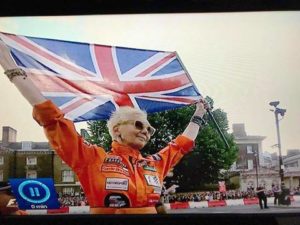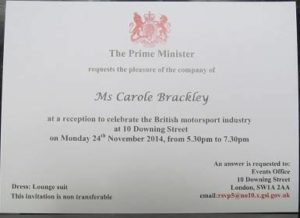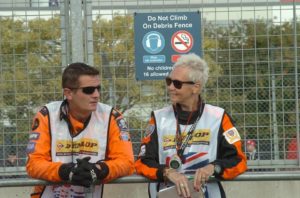Carole Brackley
Startline Marshal
What is your job title?
Could you give us a summary of your job role?

Grid Walk at the 6 Hours of Silverstone – Silverstone Circuit – Towcester, Northamptonshire – UK
Very diverse!! In the pitlane, we download and learn the Official Regulations for all the different classes before the races – they’re very detailed – and we have report sheets. We scrutinise the teams from the pitwall or inside their garage to make sure they stick to the rules. If not, we write a report which goes up to Race Control and penalties may follow. Some race meets use marshals to man the speed gun; we also control pit exit lights and any flags required, including the chequered flag, warning flags and number boards. We guide the cars to Parc Ferme and make sure no-one touches them until they have been scrutinised.
I love gridding up .. armed with a formation sheet, we go out onto the track and guide drivers to their correct position for the start. Once they are correctly placed we help clear the track ready for the warm up lap and then stand aside. We are armed with a yellow warning flag, to signal to drivers further back that our car has a problem starting. We return to the pit wall, showing a number board to our driver opposite his mark and, again, we are ready to flag any problems.
Then there’s the hands-on action bits; manning the gates and pushing stranded cars if necessary and always ready to grab a nearby fire extinguisher if the need arises. We also keep a close watch to keep everybody safe, especially some guests and members of the public who have been known to ambled across the fast lane looking in completely the wrong direction, mistakenly believing that they and their children are okay on the pitwall.
… and NO flipflops in the pit lane!!!
In the paddock, another duty is to call competitors to the assembly area and make sure they start off in the correct position, although it’s surprising how they can get jumbled up sometimes on their way round to the startline!!
What did you want to be when you grew up?
A dancer!!! I studied ballet and national dance at stage school from the age of 3 up until 16. In those days you had to be quite petite, and it was obvious fairly early on that I was going to be too tall to dance professionally. I took my basic teacher’s exams, but then life got distracting. Subsequently, I really had no idea what I wanted to do.
Do you have another job alongside marshalling?

I’m retired, but I enjoy voluntary work. I’ve recently joined the local County Hospital NHS Foundation Trust and my practice’s patient participation group. It’s interesting, important and I love researching all aspects of the role.
When did you know you wanted to become a marshal?
I’ve watched F1 since it was first broadcast by the BBC and I had a good friend who was a Silverstone Marshal in the 70s. I didn’t even consider marshalling then, as it was portrayed as a solely male role, but if I had been able to join then, I would have. It wasn’t until post-2012 Olympic Ambassador duties that I needed to fill that void; I opened the Silverstone website, clicked the link and tentatively asked to join.
What has been your biggest challenge?
I have faced a few personal challenges over the years but through the support of friends and family have always managed to find my way. Life is never straight forward but often the setbacks just make us stronger and more determined.
What is the best thing about your job, and what have the highlights been for you?
 The best thing is that you get closer to the action than most and feel a part of it… when you stand just behind the Armco at pit entry during an F1 race weekend as all the cars pass so close to you, or at pit exit at the support pits and the cars accelerate down and move close in the take the corner at Copse – and you can see the drivers eyes (however briefly) I’m not sure you can get any closer to the cars at speed.
The best thing is that you get closer to the action than most and feel a part of it… when you stand just behind the Armco at pit entry during an F1 race weekend as all the cars pass so close to you, or at pit exit at the support pits and the cars accelerate down and move close in the take the corner at Copse – and you can see the drivers eyes (however briefly) I’m not sure you can get any closer to the cars at speed. or attending a reception at No10 Downing Street to honour the British motorsport industry;
or attending a reception at No10 Downing Street to honour the British motorsport industry;Is it a straightforward process to become a marshal?
What has been your biggest challenge?
Apart from trying to communicate with Italian pit crews, ?… trying a stint in Race Control at Silverstone Wing. With so many screens to monitor, taking radio messages from all posts around the circuit and logging them correctly, passing them on to the appropriate person and unexpectedly being asked if the Safety Car was clear to go whilst you’re in the middle of logging and not watching the screens at that moment!!! *panic*
What would you say to someone to inspire them to become a marshal themselves?
 If you enjoy motorsport, there is no better way to get close to the action and feel your part of it than to marshal. Even the people paying megabucks won’t get as close to moving cars, or in some championships like WEC, Blancpain & Brtish GTs, work inside the garage (a very kind Allan McNish offered me a warm drink in the Audi WEC box, when snow stopped practice!)
If you enjoy motorsport, there is no better way to get close to the action and feel your part of it than to marshal. Even the people paying megabucks won’t get as close to moving cars, or in some championships like WEC, Blancpain & Brtish GTs, work inside the garage (a very kind Allan McNish offered me a warm drink in the Audi WEC box, when snow stopped practice!)Any other information or advice for someone looking to do what you do?
- the volunteers section of the motorsport uk webpage
- contacting your local circuit
- BARC, BMMC, MSVR, BRSCC
- https://www.marshals.co.uk/
IMPORTANT NOTE: No part of this case study may be reproduced without prior written permission.
